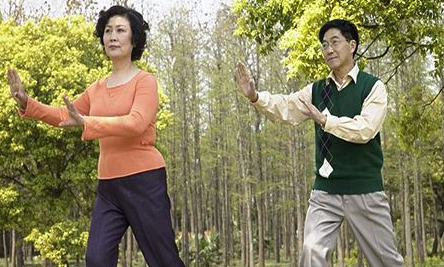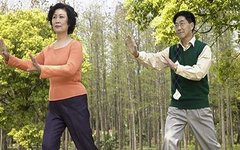Traditional Chinese Medicine Health Knowledge Updated Daily
Benefits of Qigong Practice for the Elderly | Precautions After Practice
Many elderly individuals have found that through practicing Qigong, they can read books and newspapers without reading glasses. Additionally, many have experienced a reversal of gray hair to black, normalization of high blood pressure, alleviation of angina symptoms, and stabilization of blood sugar levels in diabetic patients. The therapeutic effects of Qigong on age-related ailments are significant, thus it is essential for middle-aged and elderly friends to practice Qigong.
1. Qigong Can Delay the Aging of Internal Organs
As individuals reach middle age, their internal organs begin to age, and by old age, these organs may undergo pathological changes. One major reason for this is impaired blood circulation. Conditions such as high cholesterol, high blood lipids, increased blood viscosity, and atherosclerosis can lead to arteriosclerosis and poor blood circulation, all of which fall under the category of Qi stagnation and blood stasis in Traditional Chinese Medicine (TCM). Practicing Qigong can reduce blood viscosity, lower cholesterol and blood lipids, and enhance the function of internal organs, thereby delaying their aging.
2. Qigong Can Enhance Immune Function
With consistent practice of Qigong, the secretion of saliva increases, which contains various immune cells that can boost the immune system. Research has shown that individuals who practice Qigong have a higher count of immune cells in their blood compared to those who do not practice. These findings support the notion that practicing Qigong can reduce the incidence of colds, infections, and age-related diseases.

3. Qigong Improves Blood Circulation and Alleviates Blood Stasis
Scientific experiments have observed improvements in the microcirculation of practitioners. The microvascular loops in the fingers of Qigong practitioners have increased in number and openness compared to before practice, indicating that Qigong is beneficial for blood circulation. Improved blood circulation can prevent many diseases, such as coronary heart disease, cerebral thrombosis, and insufficient cerebral blood supply. Additionally, Qigong can improve the physiological state of organs that have already developed blood stasis, such as myocardial infarction, cerebral thrombosis, and early liver cirrhosis.
4. Qigong Can Unblock Meridians and Eliminate Pathogenic Qi
Many Qigong practitioners report sensations of Qi flowing to areas of illness, such as experiencing pressure or throbbing in painful areas during practice. Once the meridians are unblocked, practitioners often feel a warm current flowing through the meridians, leading to the disappearance of headaches. Long-term practitioners without illnesses show more open meridians when tested with instruments (meridian detectors) compared to those who do not practice or those with illnesses. This indicates that Qigong can enhance meridian flow. Individuals with blockages in their meridians can gradually clear these blockages through practice, leading to recovery from their ailments.
Precautions After Practicing Qigong
1. Avoid Squatting or Sitting to Rest
Immediately squatting or sitting down to rest after exercise can hinder blood return from the lower limbs, affecting blood circulation and increasing fatigue. In severe cases, it can lead to gravitational shock. Therefore, after each session of exercise, one should adjust their breathing rhythm, walk while swinging their arms, and perform some relaxation and adjustment activities to promote blood return to the heart, clear the “oxygen debt,” accelerate recovery, and eliminate fatigue.

